【精品】高中情态动词练习题及答案详解
高中情态动词练习题及答案详解
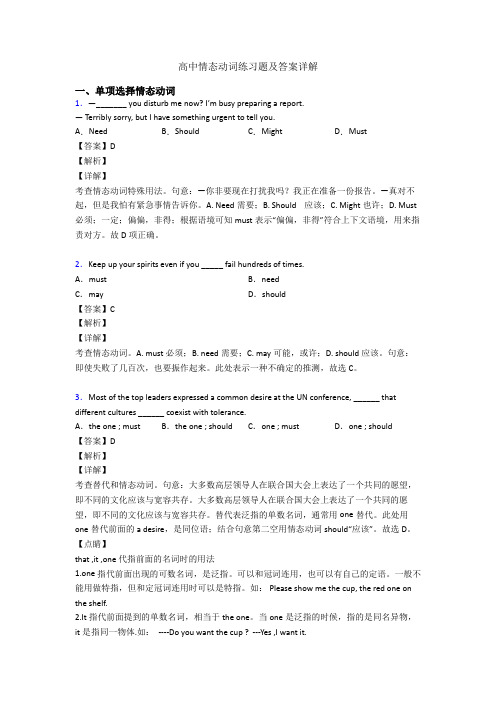
高中情态动词练习题及答案详解一、单项选择情态动词1.—_______ you disturb me now? I’m busy preparing a report.— Terribly sorry, but I have something urgent to tell you.A.Need B.Should C.Might D.Must【答案】D【解析】【详解】考查情态动词特殊用法。
句意:—你非要现在打扰我吗?我正在准备一份报告。
—真对不起,但是我怕有紧急事情告诉你。
A. Need需要;B. Should 应该;C. Might也许;D. Must 必须;一定;偏偏,非得;根据语境可知must表示“偏偏,非得”符合上下文语境,用来指责对方。
故D项正确。
2.Keep up your spirits even if you _____ fail hundreds of times.A.must B.needC.may D.should【答案】C【解析】【详解】考查情态动词。
A. must必须;B. need需要;C. may可能,或许;D. should应该。
句意:即使失败了几百次,也要振作起来。
此处表示一种不确定的推测,故选C。
3.Most of the top leaders expressed a common desire at the UN conference, ______ that different cultures ______ coexist with tolerance.A.the one ; must B.the one ; should C.one ; must D.one ; should【答案】D【解析】【详解】考查替代和情态动词。
句意:大多数高层领导人在联合国大会上表达了一个共同的愿望,即不同的文化应该与宽容共存。
大多数高层领导人在联合国大会上表达了一个共同的愿望,即不同的文化应该与宽容共存。
高中情态动词练习题及答案详解

高中情态动词练习题及答案详解一、单项选择情态动词1.---We want someone to design the new art museum for me.---_____ the young fellow have a try?A.Shall B.May C.Will D.Need【答案】A【解析】【详解】考查情态动词。
句意:——我们想找人为我设计一个新的艺术博物馆。
——是不是让这位年轻小伙子试一试?shall作为情态动词,用于二三人称,表示"询问","警告","允诺","命令","决心","强制"等语气。
will作为情态动词,用于主语是各种人称的陈述句中,表示"意愿"和"倾向"。
用于第二人称的疑问句中,表"请求"。
故选A。
2.Paul did a great job in the speech contest. He many times last week.A.need have practised B.might practiseC.must have practised D.could practise【答案】C【解析】【详解】考查情态动词。
句意:保罗在演讲比赛中表现得很好。
他上星期一定练习了很多次。
must have done是对过去发生的动作最有把握的猜测,意思是“一定”。
故C选项正确。
3.Ann said whenever her father was unhappy he ________ go out and buy something, usually something large and useless.A.should B.couldC.would D.might【答案】C【解析】【详解】考查情态动词。
高考情态动词单选20题答案解析版

高考情态动词单选20题答案解析版1. She ______ know the answer. She always gets good grades in English.A.mustB.canC.mayD.could答案:A。
选项A“must”表示肯定的推测,意为“一定”,根据后句她英语总是得高分,可以推断她一定知道答案。
选项B“can”表示能力,“能、会”;选项C“may”表示可能性较小的推测,“可能”;选项D“could”表示过去的能力或委婉的请求等。
2. You ______ finish your homework before you watch TV.A.mustB.canC.mayD.could答案:A。
“must”在这里表示“必须”,在看电视之前必须完成作业。
选项B“can”表示能力或允许;选项C“may”表示可能或允许;选项D“could”表示过去的能力或委婉的请求等。
3. He ______ be at home. I just saw him go out.A.mustn'tB.can'tC.may notD.couldn't答案:B。
“can't”表示否定的推测,“不可能”,因为刚刚看到他出去了,所以他不可能在家。
选项A“mustn't”表示禁止;选项C“may not”表示可能性较小的否定推测;选项D“couldn't”表示过去的否定推测,语气比“can't”弱。
4. —______ I use your pen?—Sure. Here you are.A.MustB.CanC.MayD.Could答案:B。
这里表示请求,“我能使用你的钢笔吗?”“can”可以用于请求允许。
选项A“must”表示必须;选项C“may”也可以用于请求允许,但语气比“can”弱;选项D“could”用于委婉的请求。
5. She ______ have forgotten to bring her book. She is always very careful.A.mustn'tB.can'tC.may notD.couldn't答案:B。
高中英语情态动词形式单选题60题(含答案)
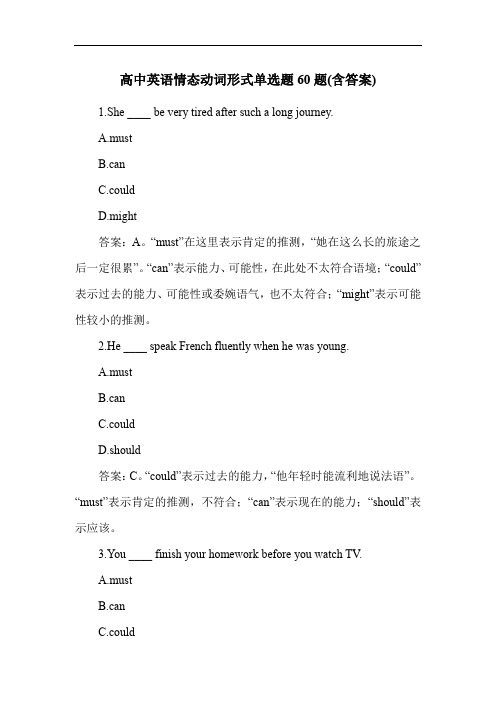
高中英语情态动词形式单选题60题(含答案)1.She ____ be very tired after such a long journey.A.mustB.canC.couldD.might答案:A。
“must”在这里表示肯定的推测,“她在这么长的旅途之后一定很累”。
“can”表示能力、可能性,在此处不太符合语境;“could”表示过去的能力、可能性或委婉语气,也不太符合;“might”表示可能性较小的推测。
2.He ____ speak French fluently when he was young.A.mustB.canC.couldD.should答案:C。
“could”表示过去的能力,“他年轻时能流利地说法语”。
“must”表示肯定的推测,不符合;“can”表示现在的能力;“should”表示应该。
3.You ____ finish your homework before you watch TV.A.mustB.canC.could答案:A。
“must”表示必须,“你必须在看电视之前完成作业”。
“can”表示能力、可能性;“could”表示过去的能力、可能性或委婉语气;“may”表示可能。
4.____ I borrow your pen?A.MustB.CanC.CouldD.Will答案:B。
“Can I...?”表示请求,“我能借你的笔吗?”“Must”表示必须,语气太强;“Could”用于更委婉的请求,但不如“Can”常用;“Will”表示将来。
5.She ____ have forgotten her keys. She's always so careful.A.can'tB.mustn'tC.shouldn'tD.needn't答案:A。
“can't”表示否定的推测,“她不可能忘了钥匙,她总是很细心”。
“mustn't”表示禁止;“shouldn't”表示不应该;“needn't”表示不必。
高中英语情态动词形式练习题40题含答案解析
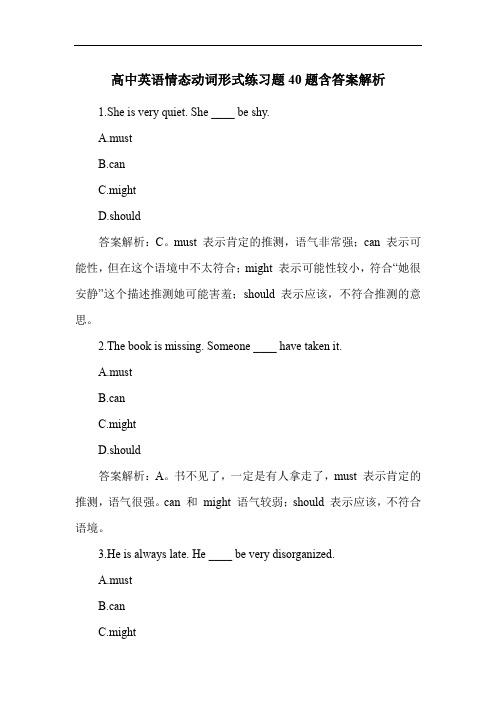
高中英语情态动词形式练习题40题含答案解析1.She is very quiet. She ____ be shy.A.mustB.canC.mightD.should答案解析:C。
must 表示肯定的推测,语气非常强;can 表示可能性,但在这个语境中不太符合;might 表示可能性较小,符合“她很安静”这个描述推测她可能害羞;should 表示应该,不符合推测的意思。
2.The book is missing. Someone ____ have taken it.A.mustB.canC.mightD.should答案解析:A。
书不见了,一定是有人拿走了,must 表示肯定的推测,语气很强。
can 和might 语气较弱;should 表示应该,不符合语境。
3.He is always late. He ____ be very disorganized.A.mustB.canC.might答案解析:A。
他总是迟到,肯定是非常没有条理,must 表示肯定的推测,语气强。
can 和might 可能性较小;should 表示应该,不合适。
4.The lights are on. Someone ____ be at home.A.mustB.canC.mightD.should答案解析:A。
灯亮着,肯定有人在家,must 表示肯定的推测,语气强。
can 和might 可能性较小;should 表示应该,不符合语境。
5.The test was very difficult. She ____ have passed it.A.mustB.canC.mightD.should答案解析:C。
考试很难,她可能通过了,might 表示可能性较小。
must 语气太强;can 表示可能性,但不太符合这个语境;should 表示应该,不符合推测的意思。
6.He looks very tired. He ____ have worked hard.A.mustB.canD.should答案解析:A。
高考情态动词练习题及答案详解

高考情态动词练习题及答案详解一、单项选择情态动词1.Look! There are so many mistakes in your composition. You ________ have fixed full attention on it.A.can B.shouldC.need D.might【答案】B【解析】【详解】考查情态动词。
句意:看!你的作文里有那么多的错误。
你本应该把所有的注意力都集中在它上面的。
表示“本应该做但实际上没有做”应该用should have done结构,can have done 表示可能;need表示需要;might have done表示可能做过某事;故选B。
2.—I don’t really like Janes. Why did you invite him?—Don’t worry. He come. He said he was’t certain what his plans were.A.must not B.need not C.would not D.might not【答案】D【解析】考察情态动词,题干中的h e wasn’t certain说明他可能不来,可能来,因此使用不完全否定,might not。
3.-- Did Jim come?-- I don’t know. He _______ while I was out.A.might have come B.might comeC.must have come D.should have come【答案】A【解析】【详解】考查情态动词推测用法。
句意:Jim来了吗?--我不知道,在我不在的时候,可能来过。
根据前文I don’t know.可知,说话者不知道Jim来没来,因此后文推测来过,但是语气很不确定,故可知选A。
对过去情况的推测为情态动词+have done,must have done 一定做了某事,should have done 应该来过,不符合,故选A。
高二英语情态动词用法单选题30题(答案解析)

高二英语情态动词用法单选题30题(答案解析)1.You look very tired. You can take a break.A.canB.couldC.mayD.might答案:A。
“can”在这里表示“能够”,强调能力。
“could”是“can”的过去式,也可表示委婉语气,但此句中无需用过去式或委婉语气。
“may”通常表示“可能”或“许可”,不符合语境。
“might”是“may”的过去式,用法与“may”类似,也不符合此语境。
2.I'm not sure if he will come. He may come later.A.canB.couldC.mayD.might答案:C。
“may”表示“可能”,符合不确定他是否会来但觉得有可能来的语境。
“can”强调能力;“could”可表过去能力或委婉语气;“might”表示可能性比“may”更小,此句中只是不确定的可能,用“may”更恰当。
3.She said she could help me with my homework.A.canB.couldC.may答案:B。
“could”在这里表示过去的能力,符合句子中“她说她能帮我做作业”这个过去的语境。
“can”是现在的能力;“may”表示可能或许可;“might”表示可能性较小,且通常不是过去的能力。
4.It might rain later. So take an umbrella.A.canB.couldC.mayD.might答案:D。
“might”表示可能性较小,“可能一会儿会下雨,所以带把伞”,符合不确定的较小可能性的语境。
“can”强调能力;“could”可表过去能力或委婉语气;“may”表示可能性比“might”稍大。
5.We can go to the park if the weather is nice.A.canB.couldC.mayD.might答案:A。
高中英语情态动词专项练习200题(含答案)
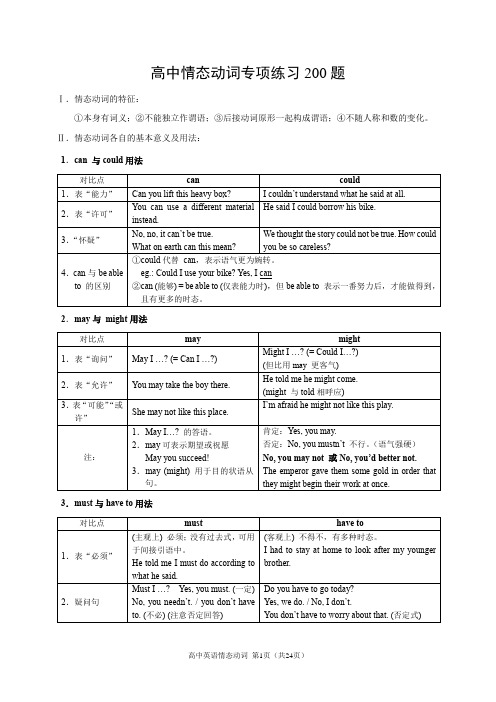
高中情态动词专项练习200题Ⅰ.情态动词的特征:①本身有词义;②不能独立作谓语;③后接动词原形一起构成谓语;④不随人称和数的变化。
Ⅱ.情态动词各自的基本意义及用法:1.can 与could用法2.may与might用法3.must与have to用法4.need与dare用法5.should与ought to用法6.shall与will用法7.used to与would用法Ⅲ.情态动词表推测:1.大多数情态动词(除表‘能力、许可、意志’外),都可以表示推测,其程度有差异。
按可能性程度的高低排列为:must﹥will ﹥would ﹥ought to ﹥should完全肯定完全可能很可能﹥can ﹥could﹥may ﹥might可能有可能2.区分情态动词的否定含义:may not或许不、可能不might not可能不can’t 不可能mustn’t不许、禁止shouldn’t不应该needn’t 不必3.情态动词表推测具体运用:情态动词可以对现在、进行、过去推测。
4.表示反劝的特殊的表推测形式5.注意:Ⅳ.情态动词表推测的反意疑问句1.情态动词表推测的反意疑问句,简单来说,就是以情态动词后的时态为淮,如句子里有明确的时间状语,则以其为准。
2.以must 为例:e.g.: 1.You must be hungry now, aren’t you?2.He must be watching TV , isn’t he ?3.Tom must have lived her for a long time, hasn’t he ?4.She must have arrived yesterday, didn’t she?注:如选择题中(以She must have arrived yesterday, didn’t she?为例)既有didn’t she又有hasn’t she 则以didn’t she?为最佳答案。
高考(完整版)情态动词专题(练习题含答案)
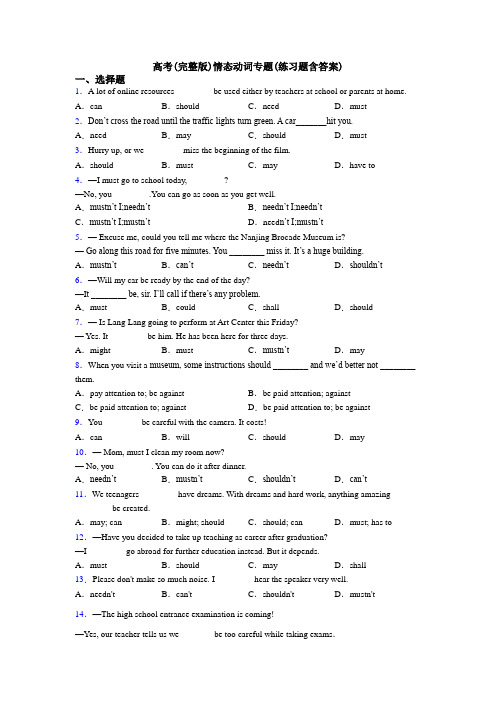
高考(完整版)情态动词专题(练习题含答案)一、选择题1.A lot of online resources ________ be used either by teachers at school or parents at home. A.can B.should C.need D.must2.Don’t cross the road until the traffic lights turn green. A car_______hit you.A.need B.may C.should D.must3.Hurry up, or we ________ miss the beginning of the film.A.should B.must C.may D.have to4.—I must go to school today, ________?—No, you ________.You can go as soon as you get well.A.mustn’t I;needn’t B.needn’t I;needn’tC.mustn’t I;mustn’t D.need n’t I;mustn’t5.— Excuse me, could you tell me where the Nanjing Brocade Museum is?—Go along this road for five minutes. You ________ miss it. It’s a huge building. A.mustn’t B.can’t C.needn’t D.shouldn’t 6.—Will my car be ready by the end of the day?—I t ________ be, sir. I’ll call if there’s any problem.A.must B.could C.shall D.should7.— Is Lang Lang going to perform at Art Center this Friday?— Yes. It ________ be him. He has been here for three days.A.might B.must C.mustn’t D.may8.When you visit a museum, some instructions should ________ and we’d better not ________ them.A.pay attention to; be against B.be paid attention; againstC.be paid attention to; against D.be paid attention to; be against9.You ________ be careful with the camera. It costs!A.can B.will C.should D.may10.— Mom, must I clean my room now?— No, you ________. You can do it after dinner.A.needn’t B.mustn’t C.shouldn’t D.can’t11.We teenagers ________ have dreams. With dreams and hard work, anything amazing________ be created.A.may; can B.might; should C.should; can D.must; has to 12.—Have you decided to take up teaching as career after graduation?—I ________ go abroad for further education instead. But it depends.A.must B.should C.may D.shall 13.Please don't make so much noise. I ________ hear the speaker very well.A.needn't B.can't C.shouldn't D.mustn't 14.—The high school entrance examination is coming!—Yes, our teacher tells us we _______ be too careful while taking exams.A.mustn't B.shouldn't C.needn't D.can't15.You ______ pay too much attention to your pronunciation, as it is so important in the oral (口头的) test.A.shouldn’t B.mustn’t C.can’t D.needn’t 16.—Would you please________in that way? That’s not safe!—Sorry. I won’t do it any more.A.not driving B.not to drive C.no driving D.not drive 17.Dr. Zhong Nanshan once said, "To prevent the spread of this disease, we________never be too careful."A.can B.may C.must D.should18.—Will your mother be at home this Saturday?—Hard to say. She _______go to the countryside to see my grandparents.A.must B.may C.can D.would19.Think twice before making a decision, or you __________ get into trouble.A.may B.can't C.shouldn't D.mustn't20.I ________ hear you clearly. Would you please repeat it?A.mustn’t B.can’t C.needn’t D.shou ldn’t 21.Look at the floor, Tom! ________ you watch TV while having a meal?A.Should B.Could C.Must D.May22.You _________ smoke here! Look at the sign. It says "No smoking".A.needn't B.mustn't C.can D.may23.— Listen! Tom ________ be listening to the music while doing his homework.—Let’s go upstairs to remind him to turn it off.A.should B.could C.would D.must24.—Will Jim come to Yangzhou for a holiday?—He ________come and it depends on how much homework he will have.A.may B.should C.must D.need25.—In China, many parents complain that their children have to stay up late to do the homework.—Don’t worry. The government has realized the problem. I’m sure there ________ be good news soon.A.can B.should C.need D.must26.I think all the students love the weekends because, to them, they ________ get up early on Saturdays or Sundays.A.mustn’t B.don’t need C.needn’t D.can’t27.When people are waiting at the zebra crossing, cars and buses ________ wait and let them go first.A.must B.may C.can D.need28.—Shall I tell him the change of the time right now?—I’m afraid you ________, otherwise he will be late for the meeting.A.can B.may C.must D.need29.It’s of great importance to protect the environment. Each of us ________ take an active part in it.A.can B.may C.would D.should 30.—Must we stop the Japanese government discharging nuclear waste water (排放核污水) into the Pacific Ocean?—________. Because everyone should protect our earth and it is bad ________ us to eat the polluted seafood and drink the waste water.A.Yes, we can; of B.No, we mustn’t; of C.Yes, we must; for D.No, we needn’t; for 31.According to the rule, used batteries ________ be dropped in the red bin for harmful wastes. A.may B.would C.should D.might32.Cars ________ give way to walkers on some roads in Binhai, or the drivers will be fined. A.may B.will C.can D.must33.Mr. Black ________ be at home now. He went abroad on vacation last Friday.A.can’t B.mustn’t C.needn’t D.shouldn’t 34.—How beautiful the winter jasmines (迎春花) are!—Yes. These golden-yellow flowers ________ be widely seen in my city in March.A.must B.can C.would D.should35.— What do you think of the show yesterday?— Some of them were really good but others ________ be better.A.will B.must C.need D.can 36.—Who’s the man over ther e? Is that Mr. Black?—It ________ be him. Mr. Black is much taller than that man.A.may B.must C.can’t D.mustn’t37.—________ I see your ID card? We have to check your personal information.—Sure. Here you are.A.May B.Need C.Should D.Must38.—I don’t care what people think.—Well, you _______ . Some opinions are worth weighing.A.should B.might C.could D.would39.—I think they are enough. We ________ make so many chairs.—I don’t think so. Because nearly a quarter of them need ________.A.don’t need to; mending B.needed; to be mendedC.don’t need; mend D.need; to mend40.—Seventy dollars for such a dress! You ________ be joking!—I’m serious. It’s made of silk from Hangzhou.A.must B.need C.will D.can【参考答案】一、选择题1.A解析:A【详解】句意:很多在线资源既可以供学校的老师使用,也可以供家长在家使用。
【英语】高考英语情态动词题20套(带答案)及解析
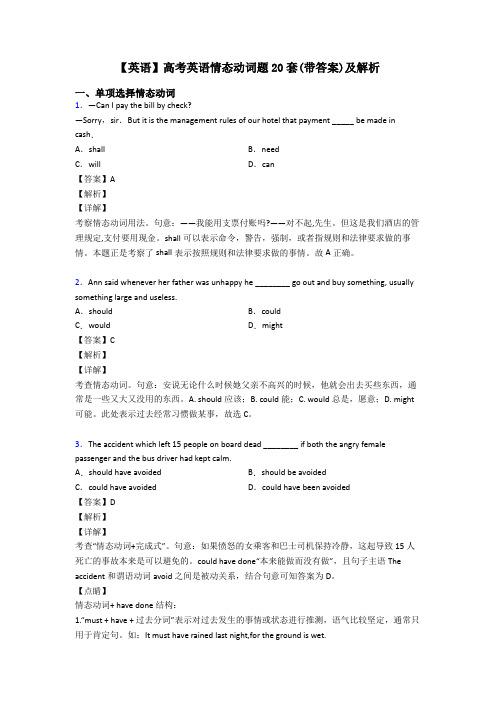
【英语】高考英语情态动词题20套(带答案)及解析一、单项选择情态动词1.—Can I pay the bill by check?—Sorry,sir.But it is the management rules of our hotel that payment _____ be made in cash.A.shall B.needC.will D.can【答案】A【解析】【详解】考察情态动词用法。
句意:——我能用支票付账吗?——对不起,先生。
但这是我们酒店的管理规定,支付要用现金。
shall可以表示命令,警告,强制,或者指规则和法律要求做的事情。
本题正是考察了shall表示按照规则和法律要求做的事情。
故A正确。
2.Ann said whenever her father was unhappy he ________ go out and buy something, usually something large and useless.A.should B.couldC.would D.might【答案】C【解析】【详解】考查情态动词。
句意:安说无论什么时候她父亲不高兴的时候,他就会出去买些东西,通常是一些又大又没用的东西。
A. should应该;B. could能;C. would总是,愿意;D. might 可能。
此处表示过去经常习惯做某事,故选C。
3.The accident which left 15 people on board dead ________ if both the angry female passenger and the bus driver had kept calm.A.should have avoided B.should be avoidedC.could have avoided D.could have been avoided【答案】D【解析】【详解】考查“情态动词+完成式”。
高考英语情态动词真题汇编(含答案)及解析
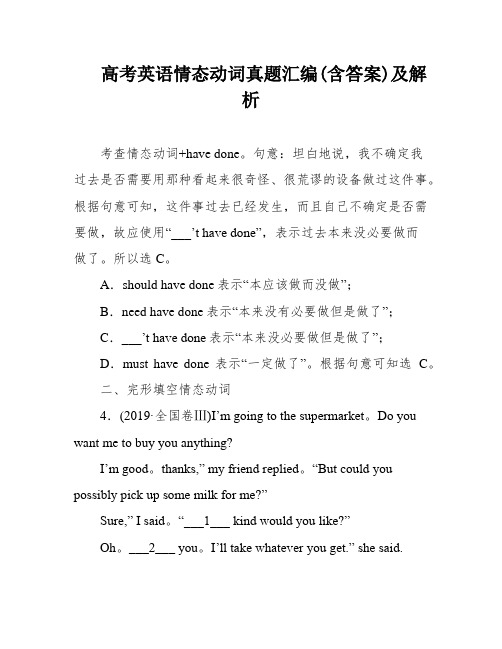
高考英语情态动词真题汇编(含答案)及解析考查情态动词+have done。
句意:坦白地说,我不确定我过去是否需要用那种看起来很奇怪、很荒谬的设备做过这件事。
根据句意可知,这件事过去已经发生,而且自己不确定是否需要做,故应使用“___’t have done”,表示过去本来没必要做而做了。
所以选C。
A.should have done表示“本应该做而没做”;B.need have done表示“本来没有必要做但是做了”;C.___’t have done表示“本来没必要做但是做了”;D.must have done表示“一定做了”。
根据句意可知选C。
二、完形填空情态动词4.(2019·全国卷Ⅲ)I’m going to the supermarket。
Do you want me to buy you anything?I’m good。
thanks,” my friend replied。
“But could you possibly pick up some milk for me?”Sure,” I said。
“___1___ kind would you like?”Oh。
___2___ you。
I’ll take whatever you get.” she said.I ___3___ the supermarket and picked up a gallon of milk。
When I got to the checkout。
I ___4___ that the line was long and there was only one cashier working。
I ___5___ my head and sighed。
___6___ that it was going to take a while.Just as I was about to ___7___ the line。
高中情态动词试题及答案解析
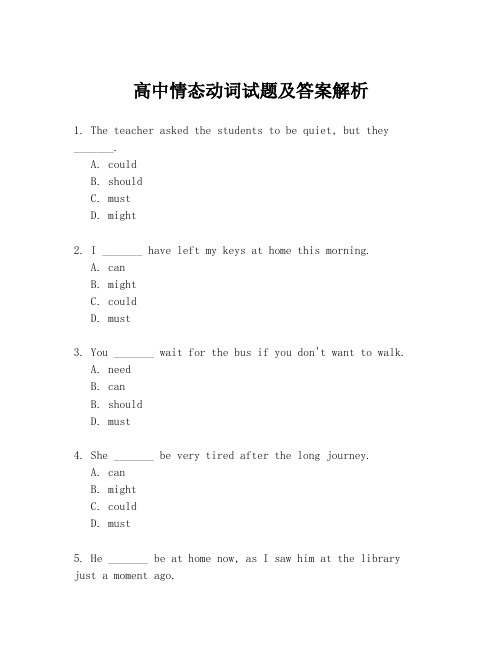
高中情态动词试题及答案解析1. The teacher asked the students to be quiet, but they_______.A. couldB. shouldC. mustD. might2. I _______ have left my keys at home this morning.A. canB. mightC. couldD. must3. You _______ wait for the bus if you don't want to walk.A. needB. canB. shouldD. must4. She _______ be very tired after the long journey.A. canB. mightC. couldD. must5. He _______ be at home now, as I saw him at the library just a moment ago.B. mustn'tC. shouldn'tD. needn't6. _______ I go to the meeting tomorrow?A. MustB. CanC. ShouldD. May7. You _______ not have finished your homework if you are watching TV now.A. can'tB. mustn'tC. shouldn'tD. needn't8. _______ I borrow your dictionary for a while?A. MayB. MustC. ShallD. Will9. They _______ have known the news before we told them.A. can'tB. couldn'tC. might notD. mustn't10. _______ you pass me the salt, please?B. CouldC. MayD. Must答案解析1. 正确答案:D. might解析:根据句意“老师要求学生们安静,但他们可能没有”,这里表示可能性,故选might。
高一英语情态动词试题答案及解析

高一英语情态动词试题答案及解析1. Do some warming up exercise before sports. Or you _______ hurt yourself.A.must B.need C.should D.may【答案】D【解析】试题分析:句意:在运动前做些热身锻炼。
否则你可能会伤到自己。
A必须;B需要;C应该;D可能,可以。
根据句意可知此处是指如果不做热身将导致的一种结果,表示一种可能性,选D。
【考点】考查情态动词。
2. When we were young, every evening my brother and I ______ stay at home waiting for our mother.A.would B.might C.should D.could【答案】A【解析】考查情态动词:句意:当我们小的时候,每天晚上我妈妈和我会呆在家里等着我妈妈。
A. would会,过去常常,B. might可能,可以,C. should应该,D. could能够,选A。
【考点】考查情态动词3. I told Sally how to get here, but perhaps I ______for her.A.had to write it out B.must have written it outC.should have written it out D.ought to write it out【答案】C【解析】考查情态动词。
根据told可知这里谈论的是过去的事了。
横线处的意思应该是:也许当初我应该给她写出来。
这样的话,选C. should have done表示:本来应该做某事,而实际上没有做。
must have done表示:过去肯定过去某事。
故C正确。
【考点】考查情态动词4. The light in his office is out. He_________ left for home.A.must have B.must have been C.should have D.should have been【答案】A【解析】句意:办公室的灯灭了,他一定已经离开回家了。
高考英语情态动词讲解及习题(附答案)
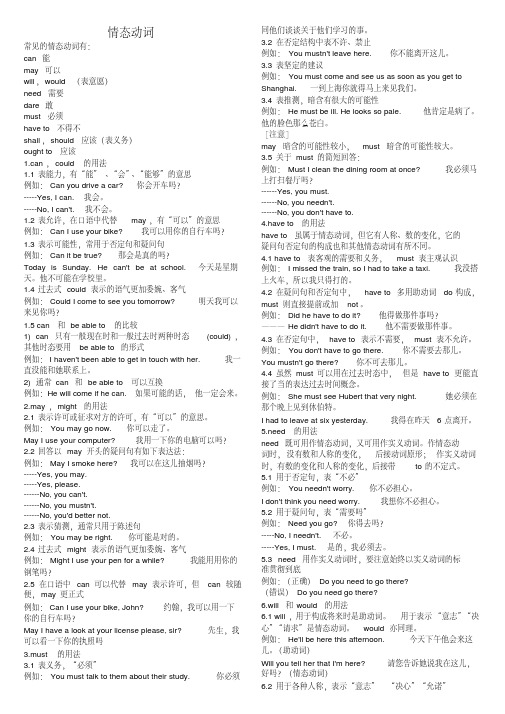
情态动词常见的情态动词有:can 能may 可以will,would (表意愿)need 需要dare 敢must 必须have to 不得不shall,should 应该(表义务)ought to 应该1.can,could 的用法1.1表能力,有“能”、“会”、“能够”的意思例如:Can you drive a car? 你会开车吗?-----Yes, I can. 我会。
-----No, I can't. 我不会。
1.2表允许,在口语中代替may,有“可以”的意思例如:Can I use your bike?我可以用你的自行车吗?1.3表示可能性,常用于否定句和疑问句例如:Can it be true?那会是真的吗?Today is Sunday. He can't be at school.今天是星期天。
他不可能在学校里。
1.4过去式could表示的语气更加委婉、客气例如:Could I come to see you tomorrow?明天我可以来见你吗?1.5 can 和be able to 的比较1) can 只有一般现在时和一般过去时两种时态(could),其他时态要用be able to的形式例如:I haven't been able to get in touch with her.我一直没能和她联系上。
2) 通常can 和be able to 可以互换例如:He will come if he can.如果可能的话,他一定会来。
2.may,might的用法2.1表示许可或征求对方的许可,有“可以”的意思。
例如:You may go now.你可以走了。
May I use your computer?我用一下你的电脑可以吗?2.2回答以may开头的疑问句有如下表达法:例如:May I smoke here? 我可以在这儿抽烟吗?-----Yes, you may.-----Yes, please.------No, you can't.------No, you mustn't.------No, you'd better not.2.3表示猜测,通常只用于陈述句例如:You may be right.你可能是对的。
【英语】高中英语情态动词常见题型及答题技巧及练习题(含答案)

【英语】高中英语情态动词常见题型及答题技巧及练习题(含答案)一、单项选择情态动词1.I often felt troubled in my teens and my grandma ________ comfort me, saying “Life is like that, dear”.A.would B.might C.should D.must【答案】A【解析】【详解】考查情态动词。
句意:在我十几岁的时候,我经常感到烦恼,我的奶奶会安慰我说,“生活就是这样,亲爱的”。
此处是would+动词原形,表示“过去总是做某事”。
故选A。
2.—You rang me up at about 10:00 last night, didn't you?—No, I didn't phone you. It someone else.A.must have been B.could be C.must be D.could have been 【答案】A【解析】【详解】考查情态动词+have done。
句意:“昨晚10点左右你给我打了电话,是吗?”“不,我没给你打电话。
一定是别人干的。
” must have done 是对过去发生的动作最有把握的猜测,意思是“一定”,结合语境可知,我没有打电话给你,因此猜测一定有别人给你打了电话。
故选A 项。
3.It ________ be the postman at the door. It's only six o'clock.A.mustn't B.can'tC.won't D.needn't【答案】B【解析】D[考查虚拟语气。
句意:不可能是邮递员在门口,才六点钟呢。
mustn't 禁止,不允许;can't 不可能;won't 不愿意,就是不,偏不;needn't 不需要。
高考情态动词练习题及配套参考答案
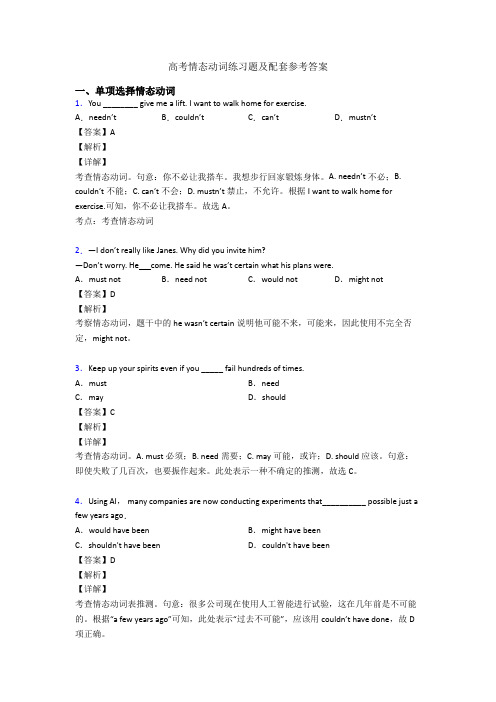
高考情态动词练习题及配套参考答案一、单项选择情态动词1.You ________ give me a lift. I want to walk home for exercise.A.needn’t B.couldn’t C.can’t D.mustn’t【答案】A【解析】【详解】考查情态动词。
句意:你不必让我搭车。
我想步行回家锻炼身体。
A. needn’t不必;B. couldn’t不能;C. can’t不会;D. mustn’t禁止,不允许。
根据I want to walk home for exercise.可知,你不必让我搭车。
故选A。
考点:考查情态动词2.—I don’t really like Janes. Why did you invite him?—Don’t worry. He come. He said he was’t certain what his plans were.A.must not B.need not C.would not D.might not【答案】D【解析】考察情态动词,题干中的he wasn’t certain说明他可能不来,可能来,因此使用不完全否定,might not。
3.Keep up your spirits even if you _____ fail hundreds of times.A.must B.needC.may D.should【答案】C【解析】【详解】考查情态动词。
A. must必须;B. need需要;C. may可能,或许;D. should应该。
句意:即使失败了几百次,也要振作起来。
此处表示一种不确定的推测,故选C。
4.Using AI, many companies are now conducting experiments that__________ possible just a few years ago.A.would have been B.might have beenC.shouldn't have been D.couldn't have been【答案】D【解析】【详解】考查情态动词表推测。
最新高中必备英语情态动词技巧全解及练习题(含答案)

最新高中必备英语情态动词技巧全解及练习题(含答案)一、单项选择情态动词1.would可以表达过去常常做的事,过去习惯发生的动作:Pirates would bury gold in a cave. 海盗们常常把黄金藏在山洞中。
We would take a walk along the river. 我们过去常常沿河散步。
3. would后接like、love、mind等动词,表示要求、邀请、希望或询问,此时不是说过去,而是对现在的询问:Would you like to come to my party? 你愿意来我的派对吗?Would you mind coming with us? 你介意和我们一起吗?比如本题,would 表示婉转的请求,征求对方的意见,故选A。
2.I’m sorry, but you _____ go wrong. There’s no such man here.A.need B.can C.must D.will【答案】C【解析】【详解】考查情态动词。
句意:很抱歉,但是你一定是弄错了。
这儿没有这么个人。
A. need需要;B. can能够;C. must必须;D. will将会。
must指有把握的推测,“一定;必定”,结合下文There’s no such man here.可知一定是弄错了。
故选C。
3.Keep up your spirits even if you _____ fail hundreds of times.A.must B.needC.may D.should【答案】C【解析】【详解】考查情态动词。
A. must必须;B. need需要;C. may可能,或许;D. should应该。
句意:即使失败了几百次,也要振作起来。
此处表示一种不确定的推测,故选C。
4.—You rang me up at about 10:00 last night, didn't you?—No, I didn't phone you. It someone else.A.must have been B.could be C.must be D.could have been 【答案】A【解析】【详解】考查情态动词+have done。
- 1、下载文档前请自行甄别文档内容的完整性,平台不提供额外的编辑、内容补充、找答案等附加服务。
- 2、"仅部分预览"的文档,不可在线预览部分如存在完整性等问题,可反馈申请退款(可完整预览的文档不适用该条件!)。
- 3、如文档侵犯您的权益,请联系客服反馈,我们会尽快为您处理(人工客服工作时间:9:00-18:30)。
You ought to / should have studied harder.你本应该更努力学习的.(但没有)
【详解】
考查情态动词。句意:保罗在演讲比赛中表现得很好。他上星期一定练习了很多次。must have done是对过去发生的动作最有把握的猜测,意思是“一定”。故C选项正确。
6.The accident which left 15 people on board dead ________ if both the angry female passenger and the bus driver had kept calm.
【点睛】
that ,it ,one代指前面的名词时的用法
1.one指代前面出现的可数名词,是泛指。可以和冠词连用,也可以有自己的定语。一般不能用做特指,但和定冠词连用时可以是特指。如:Please show me the cup, the red one on the shelf.
2.It指代前面提到的单数名词,相当于the one。当one是泛指的时候,指的是同名异物,it是指同一物体.如:----Do you want the cup ? ---Yes ,I want it.
5.Paul did a great job in the speech contest. Hemany times last week.
A.need have practisedB.might practise
C.must have practisedD.could practise
【答案】C
【解析】
【答案】D
【解析】
【详解】
考查情态动词特殊用法。句意:—你非要现在打扰我吗?我正在准备一份报告。—真对不起,但是我怕有紧急事情告诉你。A. Need需要;B. Should应该;C. Might也许;D. Must必须;一定;偏偏,非得;根据语境可知must表示“偏偏,非得”符合上下文语境,用来指责对方。故D项正确。
A.should have avoidedB.should be avoided
C.could have avoidedD.could have been avoided
Hale Waihona Puke 【答案】D【解析】【详解】
考查“情态动词+完成式”。句意:如果愤怒的女乘客和巴士司机保持冷静,这起导致15人死亡的事故本来是可以避免的。could have done“本来能做而没有做”,且句子主语The accident和谓语动词avoid之间是被动关系,结合句意可知答案为D。
中国学生的常见病句是:They...; they certainly have arrived.病句的句义是“他们当然已经到达了。”(这不是对过去的肯定推测,而是断定动作已经完成。)
8.Lack of sleep _______ lead to weakened immunity and memory, and also slow physical growth.
A.mustn’tB.shouldn’tC.wouldn’tD.mightn’t
【答案】C
【解析】
考查情态动词。句意:“数天后,我弟弟打电话说他很好,但不肯告诉我他在哪里。”mustn’t“禁止”;shouldn’t“不应该”;wouldn’t“不情愿”;mightn’t“不可能”。
11.—What’s wrong with you?
A.mightB.must
C.canD.should
【答案】B
【解析】
【详解】
考查情态动词辨析。句意:天气很冷而且地面是湿的,昨晚一定下了雨。根据上文the ground is wet可知,“昨晚下了雨”是肯定的,故用must have done“必定做了……”表示对过去十分有把握的推测,故选B。
【点睛】
3.that通常用来代替前面出现的可数名词\不可数名词,主要是用来避免重复。如:The weather of Guangzhou is hotter than that of Beijing.
4.--- Oh, my God! I just missed the last bus back home.
--- That’s really bad. I’m sure you ______ it, but you just didn’t hurry up.
A.had caughtB.could have caughtC.could catchD.can catch
【答案】B
【解析】
【详解】
考查情态动词+have done结构。句意:——哦,我的上帝!我刚好错过了回家的末班车。——这是非常糟糕的。我肯定你能赶上,但你就是不抓紧。could have done“本来能做而没有做”。故选B。
2.Keep up your spirits even if you _____ fail hundreds of times.
A.mustB.need
C.mayD.should
【答案】C
【解析】
【详解】
考查情态动词。A. must必须;B. need需要;C. may可能,或许;D. should应该。句意:即使失败了几百次,也要振作起来。此处表示一种不确定的推测,故选C。
must have done用法辨析
must have done:表示对过去的肯定的逻辑推测,推定某件事情、动作或状态可能在过去发生过(存在过)。
He must have been a doctor, for he knows medicine so well.他过去肯定是一位医生,他对医学如此了解。
【精品】高中情态动词练习题及答案详解
一、单项选择情态动词
1.—_______ you disturb me now? I’m busy preparing a report.
— Terribly sorry, but I have something urgent to tell you.
A.NeedB.ShouldC.MightD.Must
3.“may / might + have +过去分词”表示对已发生的动作或存在的状态进行不肯定的推测,might的语气比may弱一点。这种结构主要用于肯定句和否定句,疑问句改用can或could。如:They may not have known it beforehand.
4.“need + have +过去分词”表示过去做了不必做或不需要做的事情,或过去做某事纯属多余。如:I needn't have bought so much wine—only five people came.
I guess the poet would have been about twenty when she wrote her first poem.
Another worker wouldn't have acted like that.
7.It is really cold and the ground is wet; it ________ have rained last night.
如果“must + have +过去分词”句型与by now连用,还可以表示对现在完成的动作和状态的肯定推测,但实质上还是指所推测的过去的动作。例如:
They started early this morning; they must have arrived by now.他们今晨很早就出发了,现在肯定已经到了。
12.The new supermarket has announced that the first to purchase goods on the opening day________ get a big prize.
A.shallB.mustC.shouldD.can
【答案】D
【解析】
【详解】
考查情态动词辨析。句意:睡眠不足会导致免疫力和记忆力下降,还会减缓身体发育。A. shall将;B. must必须;C. should应该;D. can会,表示理论上或是逻辑判断上,用can,故选D。
9.would可以表达过去常常做的事,过去习惯发生的动作:
【点睛】
情态动词+ have done结构:
1.“must + have +过去分词”表示对过去发生的事情或状态进行推测,语气比较坚定,通常只用于肯定句。如:It must have rained last night,for the ground is wet.
2.“can / could + have +过去分词”表示对过去某种情况的怀疑或不确定。can和could一般用于否定句和疑问句,could的语气较can弱。如:He can't have finished the work so soon.
—Oh, I am sick. I ________ so much ice cream just now.
A.shouldn’t eatB.mustn’t eat
C.couldn’t have eatenD.shouldn’t have eaten
【答案】D
【解析】
【详解】
考查情态动词和虚拟语气。句意:——你怎么了?——我生病了,我刚才不应该吃那么多冰激凌。A. shouldn’t eat不应该吃;B. mustn’t eat禁止吃;C. couldn’t have eaten不可能吃;D. shouldn’t have eaten本来不应该吃。根据just now可知,是发生在过去,故选D。
